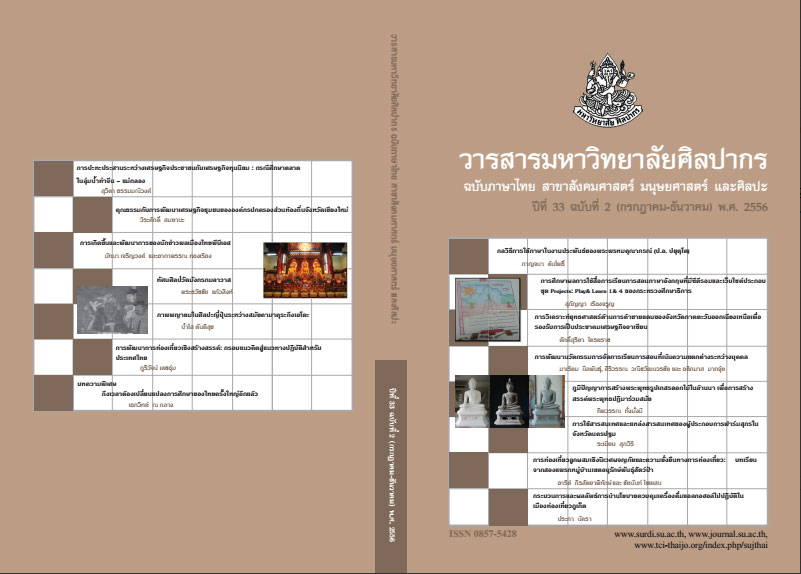การท่องเที่ยวลูกผสมเชิงนิเวศผจญภัยและความยั่งยืนทางการท่องเที่ยว: บทเรียนจากสองแพรกหมู่บ้านเขตอนุรักษ์พันธุ์สัตว์ป่า
Main Article Content
Abstract
บทคัดย่อ
การศึกษานี้วิเคราะห์ผลกระทบทางสังคมและสิ่งแวดล้อมจากการท่องเที่ยวเชิงนิเวศผจญภัยของชุมชนตำบลสองแพรก ซึ่งเป็นหมู่บ้านที่ตั้งอยู่ในเขตอนุรักษ์พันธุ์สัตว์ป่า จังหวัดพังงา จากความคิดเห็นของผู้มีส่วนได้ส่วนเสียจากการท่องเที่ยวที่อาศัยอยู่ในชุมชนและแนวทางการรักษาเอกลักษณ์ทางสังคมและสิ่งแวดล้อม เพื่อรองรับการเปลี่ยนแปลงทางด้านการท่องเที่ยวในอนาคต โดยใช้ระยะเวลาเก็บข้อมูลครั้งเดียวและศึกษาหน่วยครัวเรือนทั้งหมด (census study) จำนวน 148 ตัวอย่างโดยเก็บแบบสอบถามจากหัวหน้าครัวเรือน หรือผู้แทนครัวเรือนที่มีอายุตั้งแต่ 25 ปีขึ้นไป ผลการศึกษาพบว่าการท่องเที่ยวส่งผลกระทบทางสังคมและสิ่งแวดล้อมต่อชุมชนในภาพรวมในระดับปานกลาง (ค่าเฉลี่ย 3.32) อาทิ ผลกระทบด้านความพึงพอใจและความเสมอภาคในสังคมในระดับมาก (ค่าเฉลี่ย 3.91) รองลงมาคือผลกระทบด้านความเป็นอยู่และการครองชีพในระดับปานกลาง (ค่าเฉลี่ย 2.94) นอกจากนี้ชาวบ้านในชุมชนควรร่วมกันสร้างจิตสำนึกและความภาคภูมิใจในการอนุรักษ์วัฒนธรรม ธรรมชาติ และวิถีชีวิตชุมชน และควรมีการกำหนดกฎระเบียบและการบังคับใช้อย่างเคร่งครัดในการควบคุมแบ่งเขตการใช้พื้นที่ ควบคุมกิจกรรมการท่องเที่ยว จำนวนนักท่องเที่ยวและจำกัดอัตราการเติบโตของธุรกิจการท่องเที่ยวให้เหมาะสมกับพื้นที่และทรัพยากรของชุมชน
คำสำคัญ: 1. การท่องเที่ยวเชิงนิเวศผจญภัย. 2. การท่องเที่ยวลูกผสมเชิงนิเวศผจญภัย. 3. ความยั่งยืนทางการท่องเที่ยว. 4. หมู่บ้านเขตอนุรักษ์พันธุ์สัตว์ป่า.
Abstract
The paper analyzed the social and environmental impacts of eco-adventure tourism at Songpraek, the Wildlife Sanctuary villages in Phang-nga Province from the point of views of stakeholders living in the community and discussed the guidelines to conserve the social identity and environment to cope with the future change from tourism. The study employed the cross-sectional approach and the census study by using questionnaire survey to collect the data from the household leaders or the household representatives at age older than 25 years old with total samples at 148 persons. Results revealed that overall tourism causes the social and environmental impacts on the community at a moderate level (Means 3.32). For example, impacts on the fulfilment and the equity in the society was at a high level (Means 3.91), followed by impacts on the livelihood at a moderate level (Means 2.94). In addition, the villagers should create the awareness and pride to conserve the culture, nature and their ways of life. The regulations should be set and strictly implemented in order to control the zoning of land used, tourism activities and the number of tourists and to limit the growth rate of tourism business to properly serve the physical landscape of community and its resources.
Keywords: 1. Eco-adventure tourism. 2. Hybrids of eco-adventure tourism.3. Tourism sustainability. 4. The Wildlife Sanctuary Villages.


